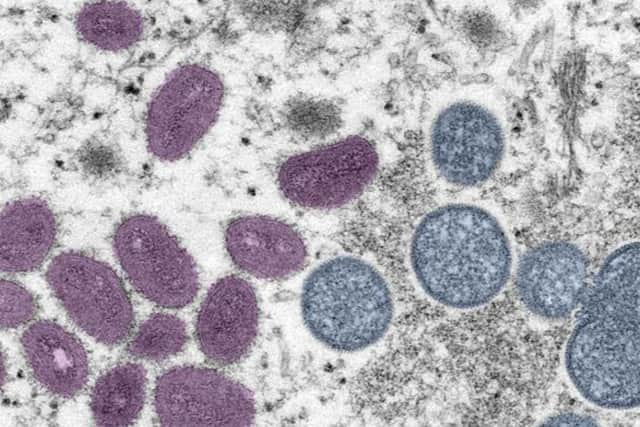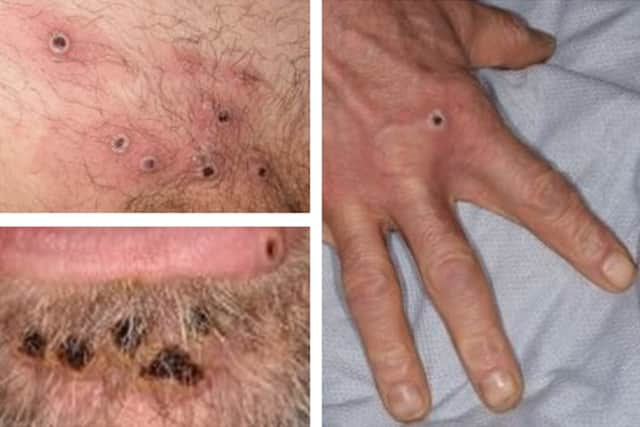‘Monkeypox here to stay’ - infection and vaccination figures for Liverpool revealed
and live on Freeview channel 276
The boss of a LGBTQ+ sexual health charity in Liverpool believes monkeypox is “here to stay”.
Ant Hopkinson, the CEO of Sahir House, said services will need to start preparing how to deal with monkeypox for the long-term. Mr Hopkinson said: “I believe monkeypox is here to stay and the virus will continue to spread if it is not actively controlled.
Advertisement
Hide AdAdvertisement
Hide Ad“I do not currently see the level of national and international effort I think would be necessary to end the outbreak when it comes to tracing contacts, isolating cases, and ring vaccinations.”


The UK Health Security Agency (UKHSA) say data shows that the virus is transmitted primarily in interconnected sexual networks of gay and bisexual men. Out of 3,215 confirmed cases in England on September 2, where gender information was available, 3,174 were men (99%) and 41 were women.
Monkeypox in Merseyside
The latest available data shows there have been eight cases recorded in Liverpool with five each in Sefton and Wirral. UKHSA said the number of new cases is declining but rises are still being seen in all areas of the country.
In Liverpool, approximately 4,000 people were first identified as eligible for a smallpox vaccine but due to shortages and to ensure doses were targeted, approximately 800 were identified as being particularly at-risk.
Advertisement
Hide AdAdvertisement
Hide AdOf these, around 370 people have received a vaccine at the Royal Liverpool University Hospital – approximately 0.07% of Liverpool.
UKHSA advice


Dr Meera Chand, Director of Clinical and Emerging Infections at UKHSA, said: “It is encouraging that the number of new monkeypox cases in the UK continues to fall. However the outbreak in the UK and around the world is not over.
“Please remember to check yourself for symptoms such as rashes and blisters, particularly if you have had new sexual partners recently and before you have sex with new partners.
“If you do have symptoms, please take a break from sex, and call 111 or a sexual health clinic. Symptoms can take up to three weeks to appear.
Advertisement
Hide AdAdvertisement
Hide Ad“If you are eligible for a vaccine, please wait to be called forward by the NHS and you will receive one once supply is available in your area. We are working with the manufacturer to ensure delivery as quickly as possible.”
Monkeypox vaccinations
The comments from Sahir House come as sexual health services in Wirral have begun referring those at-risk for vaccinations for the first time. Previously vaccines were not offered to those living on the Wirral but now those deemed to be at risk may be eligible for a vaccination through Axess Sexual Health services in Liverpool.
Vaccinations have been offered in Liverpool from August 10 but supply remains incredibly low as doses were expected to run out nationally by the end of August.
An initial 50,000 doses has already been rolled out across the UK and 100,000 doses are expected to arrive in September. The UKHSA says it is working to speed up delivery but many working in sexual health view the current number of vaccines as not enough to eradicate monkeypox in the UK.
Advertisement
Hide AdAdvertisement
Hide AdMr Hopkinson said: “There’s been no update from the UKHSA on when the doses in September are arriving. When they do come, I suspect the Liverpool City Region will still receive very few vaccines. We’re not seeing a particular rise which is encouraging but we know that things can change quickly.”
Fractional dosing is being trialled at three clinics in Manchester and London which involves injecting the vaccine under the skin. This means about a fifth of the usual dose is needed. If rolled out across the UK, it would mean more people could be vaccinated despite shortages.
Mr Hopkinson said: “The ideal is a double dose of the vaccination which significantly extends the durability of protection. While one dose of the vaccine may not completely prevent infection, the symptoms should not be as bad because the immune system is better prepared.”
Mr Hopkinson praised the local response from NHS services but said communication needs to be improved across the Liverpool City Region: “All partners and allies involved in the delivery of local and regional sexual health services need to ramp up collaborative efforts to address key barriers.
Advertisement
Hide AdAdvertisement
Hide Ad“A key challenge is communication – ensuring our approaches are consistent, authentic, tailored and influenced by the way our communities prefer to communicate and use social media.”
Mr Hopkinson said this has an impact on access to the vaccine as some at-risk populations, particularly men using cruising sites, might not use sexual health services regularly.
“We need to make sure doses are going to those most at risk. Are we getting it to the right people or are we getting people who shout the loudest?”
“The vaccine is reaching those known to sexual health services who meet current eligibility criteria. My concern is for those who are either not known – or not adequately engaged – with clinical services – this includes men who have sex with men who are not ‘out’”
Advertisement
Hide AdAdvertisement
Hide AdMr Hopkinson said this is where groups like Sahir House can step in pointing to successful outreach with sex workers and at cruising sites in Wirral and across Merseyside.
However funding remains an issue. Sahir House recently saw a large part of its funding cut this year after losing a competitive contract with Liverpool City Council prompting concerns the charity’s future was now “uncertain.”
Mr Hopkinson said: “Charities have picked up quite a bit of slack in terms of getting key monkeypox prevention and control information out there across the country but we are getting next to no funding to deal with the outbreak.”
The UKHSA were asked if it is planning to provide funding to local organisations and sexual health services. It did not respond.